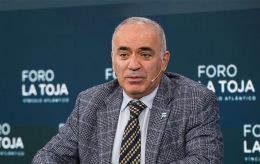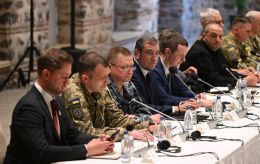Mediocre success: Ukraine's expectations for Peace Summit
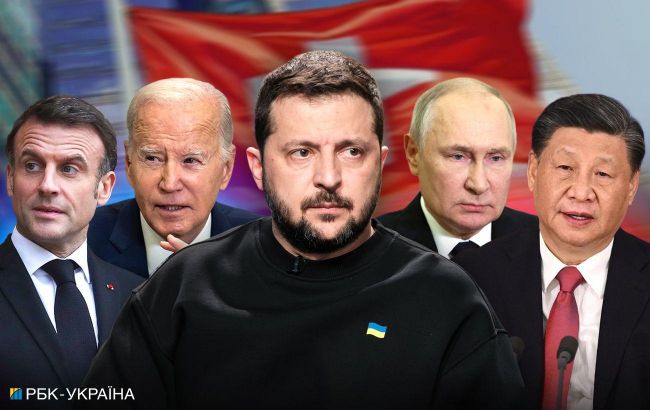 Emmanuel Macron, Joe Biden, Volodymyr Zelenskyy, Vladimir Putin, Xi Jinping (photo: RBC-Ukraine collage)
Emmanuel Macron, Joe Biden, Volodymyr Zelenskyy, Vladimir Putin, Xi Jinping (photo: RBC-Ukraine collage)
Tomorrow, the Ukraine-initiated Peace Summit will begin in Switzerland. Read more about Ukraine's initial idea, how and why it changed, and what results the summit may bring.
Contents
- Origin of Zelenskyy's formula and idea of Peace Summit
- Why Ukraine invites Global South states
- Grounds for criticism
- After Peace Summit
From the very beginning of Russia's full-scale aggression against Ukraine, there have been talks about the possibilities for a peaceful settlement. Perhaps the closest Russia and Ukraine came to this point was the first few weeks of the great war. Several rounds of negotiations took place in Belarus and Türkiye at that time but ended without results.
Nevertheless, peace was constantly on the agenda, particularly regularly raised by Ukraine's Western partners. Only many months later their rhetoric was adjusted, as they began to add important definitions to the word “peace,” such as “just peace” or “peace based on international law.” Also, instead of “peace,” “Ukraine's victory” is used more and more often. Although many still dare not speak of “Russia's defeat”.
But in the first year and a half of the full-scale war, the central theme was the abstract “peace” in which different countries put different meanings. Various “peace plans” appeared. Even a group of African countries brought their own interpretation to Kyiv. All of them could not suit Ukraine, usually because they de facto proposed freezing the situation, keeping occupied part of Ukrainian territory under Russia.
Origin of Zelenskyy's formula and idea of Peace Summit
Ukraine, which had rejected the possibility of any negotiations with the Kremlin since the summer of 2022 (Volodymyr Zelenskyy even signed a decree), realized that it needed to prepare its own alternative, which was the 10-point Zelenskyy's formula. It embodied the Ukrainian vision of a just end to the war, with the restoration of the 1991 borders, reparations from Russia, punishment for those responsible for the aggression, etc.
The formula originated not just as a theoretical concept that Ukraine could use in the media as a response to accusations of “unconstructiveness” or “unwillingness to seek peace.” It was supposed to be implemented in stages according to the following principle. First, a specific peace plan based on Zelenskyy's formula is formed at the international level, which is then offered to Russia. If Moscow refuses to implement it, it will become obvious who does not want peace.
Peace Summit at the level of the leaders of the countries is the first key point in implementing Zelenskyy's formula. Its preparation took much longer than anticipated, the dates were constantly shifted, and not even all of RBC-Ukraine's sources among top officials believed in the viability of the whole idea. Still, the summit will take place, although its format and objectives are already de facto different from the original concept.
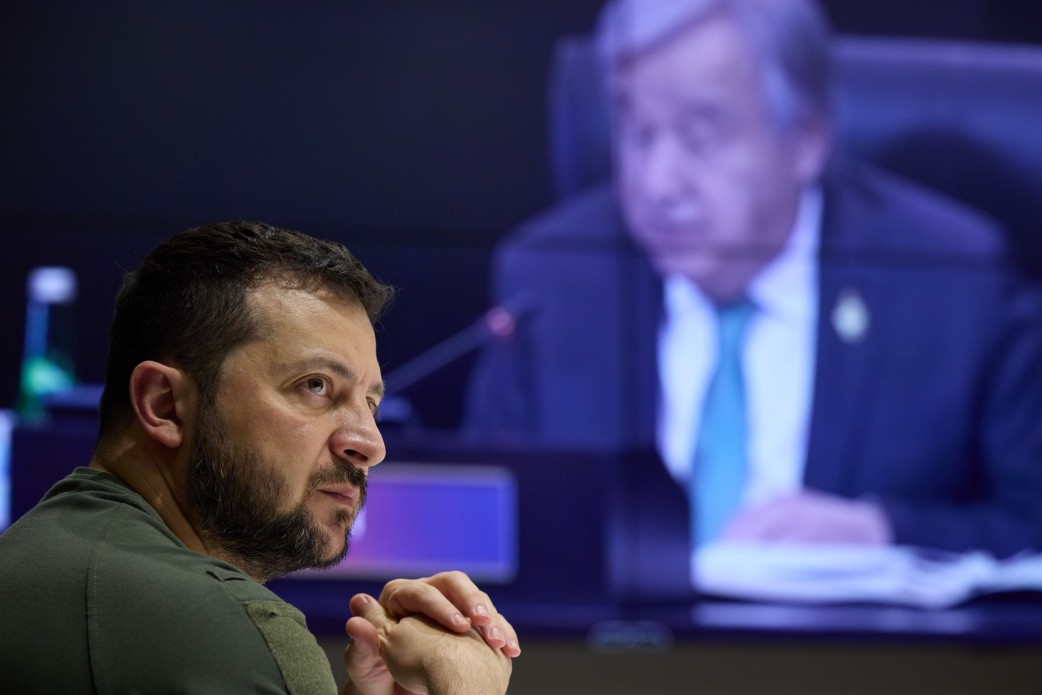 Zelenskyy presents the Peace Formula at the G20 summit (photo: president.gov.ua)
Zelenskyy presents the Peace Formula at the G20 summit (photo: president.gov.ua)
Yet, the Peace Summit has already accomplished an important task before it even began. Over time, it was the Ukrainian vision of peace within the framework of Zelenskyy's formula that began to replace any alternative peace plans on a global scale.
Of course, not only Ukrainian diplomacy facilitated the process but also the broad resilience of Ukraine on the battlefield, in the political, economic, and social fields. As Western assistance expanded and the next red lines in supplying arms to Ukraine were crossed, it became more and more clear that Ukraine would not fall anyway, while Russia would not be able to issue any ultimatums.
Besides, almost all the points of Zelenskyy's formula were written in such a way that Western countries simply could not disagree with them. No one would argue that nuclear war must be avoided, borders must not be changed by force, and prisoners of war must be returned home.
Why Ukraine invites Global South states
Initially, Kyiv's task was not to hold another high-level “forum of like-minded people” for only Ukraine's allies in the EU and NATO. The goal was to involve as many countries as possible that are not part of the Western coalition helping Ukraine.
This way, Moscow would face the fact that Ukraine's vision of peace is shared not only by the “collective West” - with whom, according to Russian propaganda, it has been at war all along - but also by a vast majority of UN member states.
This was a priori an extremely difficult task. Russia's ability to influence the Global South far exceeds Ukraine's capabilities - through historical, economic, and even corruption ties. The scope of the Russian propaganda machine is also enormous, and it does not meet an adequate alternative.
Ukraine's narrative of the current war as anti-colonial and anti-imperial did not always resonate with postcolonial states in Africa and Asia, RBC-Ukraine sources said. After all, they saw Europeans were on Ukraine's side - and Europe is perceived as colonizers.
Over time, it became clearer that the initial diplomatic plan for the Peace Summit would have to be modified and the level of ambition lowered. Developing a ready-made peace plan, or at least its concept, at the first summit and then putting it before Russia as a guideline for action was not feasible.
However, the idea of the summit was not abandoned, nor was the task of involving as many countries as possible. As a result, only three of the ten points of Zelenskyy's formula will be discussed in Switzerland, the least controversial ones - nuclear safety, free navigation, and prisoner exchange (all-for-all and the return of deported Ukrainian children).
With this agenda, Switzerland will indeed be able to gather a large representation of the Global South, not just Ukraine's Western partners. RBC-Ukraine previously detailed which world leaders would attend the summit and who would definitely not come.
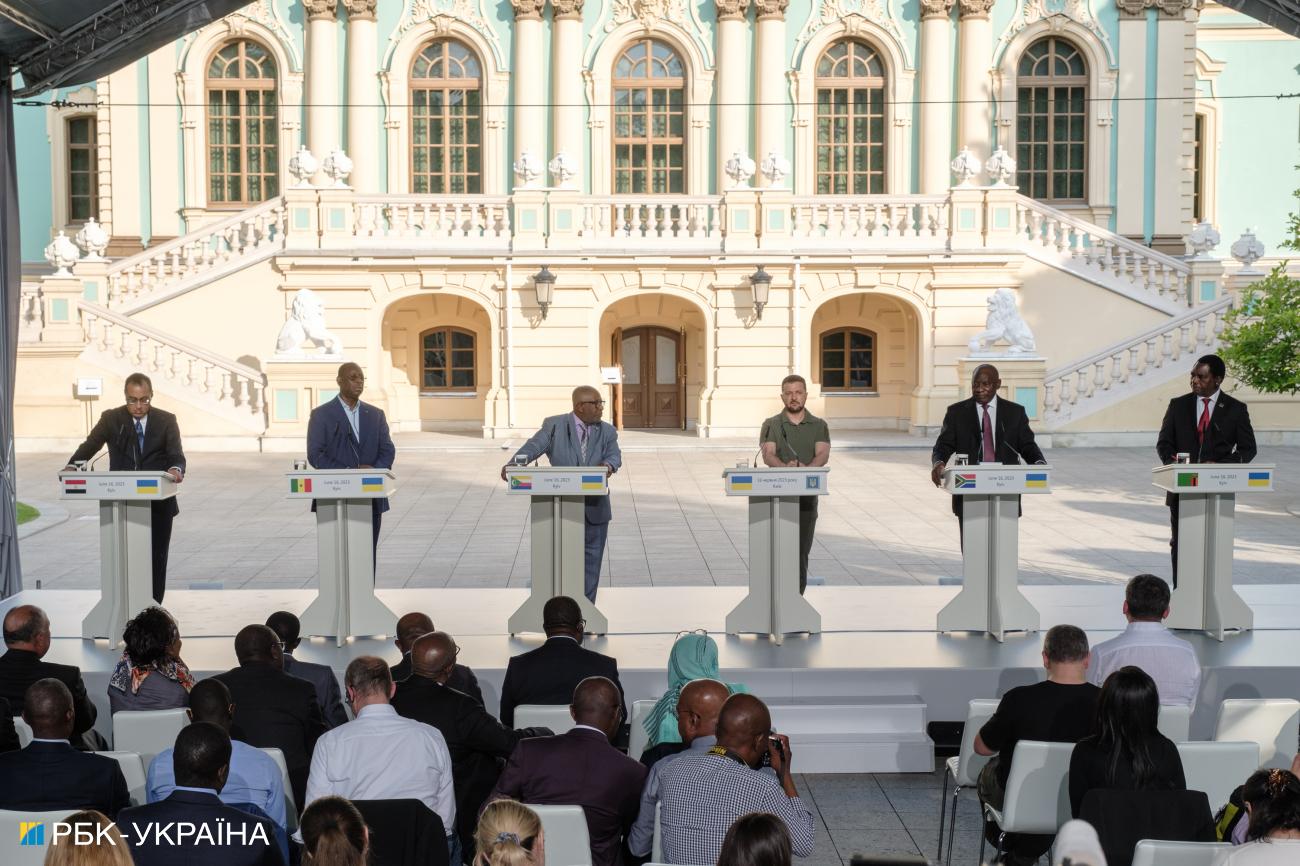
African leaders' visit to Kyiv (photo: Vitalii Nosach / RBC-Ukraine)
Ukraine's key tasks at the summit are to achieve results in specific applied issues (free export of goods through the Black Sea, return of prisoners, etc.) and to once again consolidate Zelenskyy's formula as the main concept for ending the war at the global level.
Grounds for criticism
Of course, a lot depends on the text of the final communiqué after the summit, which all participants must sign. In recent days, the media have published different versions of the draft document. Its development may continue until the end of the summit.
In any case, there will probably be many reasons for “treason.” For example, in case the document does not contain direct calls for restoring Ukraine's full territorial integrity and withdrawing occupation troops from its territory. And this is obviously not going to happen in any case, otherwise, the list of participants representing the Global South would have become noticeably smaller.
Excessive expectations from the summit are another problem. The most obvious things were explained to even its high-ranking participants, such as no peace would be concluded at the Peace Summit. “These are not negotiations to end the war,” German Chancellor Olaf Scholz recently said.
Another reason for “treason” is an appeal to involve the aggressor country in the peace process. It all depends on the final wording of the communiqué, but it is clear that any negotiations to end the war require involving all parties. Unless we are talking about the unconditional surrender of the aggressor - but so far, unfortunately, we are not talking about that.
"It is clear that Russia must participate in this process. Everyone agrees. The question is from what point it can participate,” said Swiss Foreign Minister Ignazio Cassis on the eve of the summit. Russia already said any documents resulting from the summit are worthless.
After Peace Summit
The summit is unlikely to achieve the ultimate goal of uniting the entire world in supporting the Ukrainian vision for ending the war. But this task was impossible from the beginning.
But one cannot say that the Peace Summit is ineffective either. "This is a living process and it definitely deserves to continue. We don't have many opportunities to work with non-Western countries, to be honest, we have almost none,” former Ukrainian Foreign Minister Pavlo Klimkin told RBC-Ukraine.
Following the summit, its participants will form some working groups or a similar mechanism, describe in more detail the actions to implement the three agreed points of Zelenskyy's formula, and submit them to Russia for consideration.
Whether they will pay attention is a moot point. So far, Russia has publicly stressed its complete disinterest in everything related to the Peace Summit, while in practice it is actively trying to disrupt it, primarily in terms of the number of participants.
The aggressor country may likely try to hold its own “summit” to spite Ukraine, based, for example, on the so-called Sino-Brazilian peace plan, which basically involves freezing the war.
But Klimkin does not believe in the prospects of such an event. "The Russians can drag some of their allies there, for example, Central Asian countries. But this does not mean that they will believe in this agenda. In fact, it won't help them much in any diplomatic efforts, even purely declaratively,” he said.
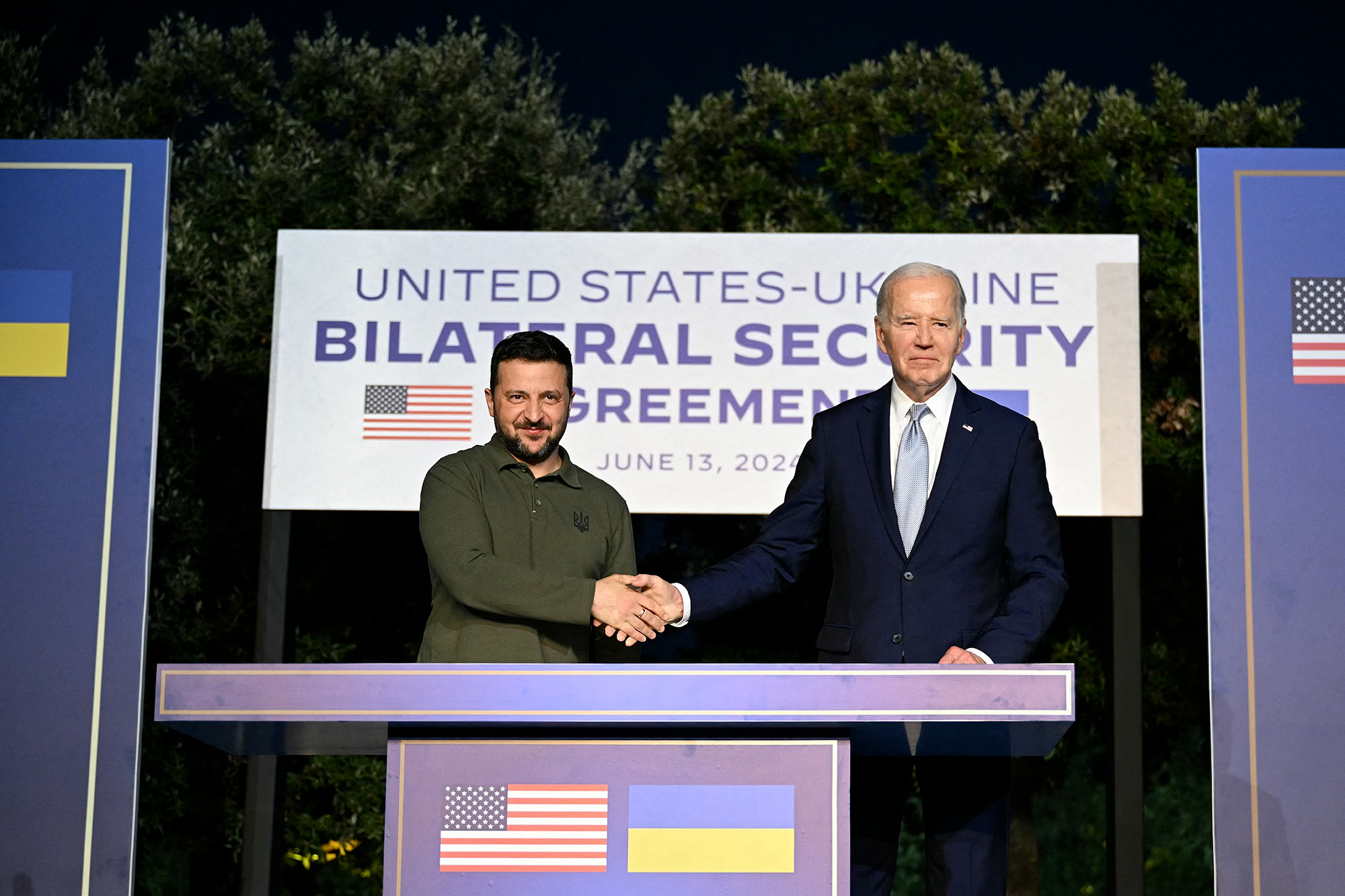
US President Joe Biden will not attend the Peace Summit but met with Volodymyr Zelenskyy twice in recent days (photo: Getty Images)
Many commentators see the practical implementation of the Peace Summit's decisions as a kind of confidence-building measure between the warring parties. First, they say, we will start talking about preventing nuclear war and famine, and then we will gradually move on to resolving political issues.
But in practice, such a transition seems unrealistic. Firstly, because of the fundamental difference in the approaches of Ukraine and Russia. Zelenskyy emphasizes that any territorial concessions are out of the question, while the aggressor country regularly calls for "taking into account the realities on the ground" (i.e. the occupation of part of Ukraine).
Secondly, Ukraine has recent experience that confirms that there is a gap between the resolution of applied humanitarian issues and a political settlement. The best proof is the many years of negotiations in the Minsk format, which sometimes managed to resolve issues such as the exchange of prisoners or the operation of checkpoints, but the issues of controlling the territories and the border remained basically unaddressed.
So, even after the Peace Summit, the war will continue in the short term. Only serious geopolitical shocks, such as Donald Trump coming to power in the United States, can change the balance of power. But this can only happen at the beginning of next year.
Sources: statements by Ukrainian, Western, and Russian officials, articles by Bloomberg and Radio Liberty, as well as comments by former Ukrainian Foreign Minister Pavlo Klimkin.
